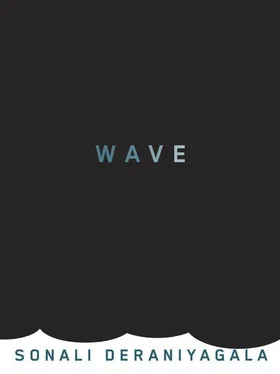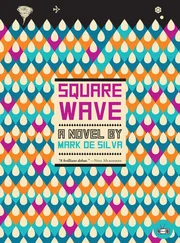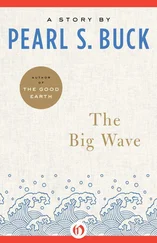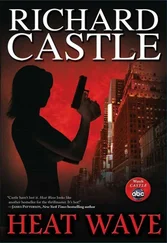I looked away from that upstairs bedroom. I stared at the empty space on the wall where the nameplate used to be. They must be still in that room, surely. It’s impossible they are not.
I didn’t go inside. Mary-Anne squeezed my hand as she started up the car to drive off. And I remembered how, on our last morning here, the day we left for Yala, I’d woken before the boys and packed their Christmas presents in two red bags. Vik had written his name on those bags with a black marker pen, one of those permanent ones.
I went back to the house at night because I could not bear to step inside in daylight. The tall metal gates shut, not partly open as they used to be. All the rooms in darkness, windows closed. The house was hushed, shuddering in disbelief. A solitary light burned on the balcony, another in the car porch. I glanced quickly at the lamp in the porch, some scraps of a nest, no birds. The large wooden front door rumbled back on its rollers. I kept my sandals on as I walked in, not kicking them off by the tall, bronze-framed mirror on the wall below the stairs, as I used to.
As I walked through those front doors, the huge silence of the house ripped through me. I had tried to come inside here on many nights before but hadn’t made it past the gates. Damn you, I kicked those metal gates, all those gin and tonics I’d knocked back powering my legs. Damn this house. Damn everything.
The house I entered was transformed, empty and vast, bereft. Just a few pieces of furniture remained, repositioned, displaced. The floors now bare, no rugs to absorb my footsteps. The walls gleamed with new paint that concealed even the impressions left by the mirrors, the paintings, and old blue and white porcelain plates that had been taken down.
I didn’t want this barrenness. I yearned for the house as it was, as we left it. I wanted to sit on every couch, on every chair they sat on, and maybe some warmth would seep into me. I wanted wardrobes full of their clothes, a mixed-up mound of the boys’ underwear in ours, a neat stack of my father’s white handkerchiefs in his. I wished I could pick up a book Vik had been reading from the table by our bed, and turn to the page he’d folded to mark where he had stopped. I wanted the green roll-on stick of mosquito repellant on that table, drying out because we had left the cap off. But none of this could be. Broken and bewildered, my brother had the house cleared and packed away, painted and polished, all in the first month or two after the wave. For him, that was the practical thing to do, to impose order on the unfathomable, perhaps. I had been collapsed on a bed in my aunt’s house at the time and could not contemplate returning to my parents’ house. I quaked at the very thought of it.
Now, in this stillness, sterile with the odor of varnish and paint, I hunted traces of us. A pencil stub with the end chewed off perhaps, a scrunched-up grocery bill, a hair floating across the floor, a squiggle made with a pen on a wall, a scrape of a fork on a table. But there was nothing. No dent, no chipped paint on the wooden banister along the stairs where a ball had been lobbed too hard. The drops of crimson nail polish on the white table in my parents’ bedroom had vanished. The chocolate smears on the sofa bleached out. Surely this cannot be. There must be some atom of our life hidden here, lingering in this quiet somewhere.
And then I saw it. The mat. Just a small square black rubber mat with little round bristles, unremarkable. But I was transfixed. This was the mat Vik wiped his muddy feet on when he bounded in from the garden. The very same mat. It was inside the house now, tossed to the side by the stairs, not on the step leading out to the garden as it should be. No one had bothered to dispose of it, no one had bothered to clean it up. The gaps between the bristles were flecked with scraps of disintegrating dried grass, grains of sand, a morsel of dead beetle that the ants had tired of. Was that an imprint of Vikram’s foot? Did that speck of dirt come off his heel? This mat and suddenly the house was not so lifeless, pulsing faintly, ever so slightly charged with their presence. I could almost hear them, turning the page of a book and shifting softly on a rattan armchair, crunching a roasted cashew nut and dropping another on the floor, slipping an ice cube into a glass and placing the tongs back on the table.
I walked into the hollow that had been my father’s office. There was no large desk heaving with piles of legal briefs, those blue and beige folders frayed at the edges, sometimes tied up with a piece of thin ribbon. The wooden shelves that stretched from the floor to the ceiling on two walls were bare, the top ones no longer warped by the weight of too many books. No antique maps of Sri Lanka hung above the desk. One of these maps, from the sixteenth century, showed the island as a rectilinear pentagon, not unlike a small child’s lopsided drawing of a house, and in the middle, along with a few mountains and rivers, the cartographer had etched a colorful elephant with ornate anklets on all its feet, perhaps to compensate for the lack of geographical detail.
As I stood in the dark of that room, fragments of our last days here kept flaring up, unbidden. Malli tying clusters of balloons on the frangipani trees in the back garden because we were having friends to dinner, and what’s a party without balloons. My mother teaching Vikram to play “Silent Night” on the piano, and his deliciously dimpled smile as he changes the chords and presses hard on the pedal, making the tune unrecognizable. Steve wearing that burnt-orange shirt the night we had the party, the shirt I’d bought him only that day, a tad more flamboyant than his usual choice. All of this now sharply in focus just by being within these walls, my vapor-filmed mind clearing for a while. I looked out the window and saw the lime tree in the front garden. The tangy smell of those lime leaves, when they are torn into small pieces, I know that so well. Familiar insect noises filled the outside, crickets rubbing wings together, cicadas vibrating tiny abdominal membranes. A few moments of quiescence. Home.
Upstairs in our bedroom, the two double beds, no sheets or pillows, naked. The wardrobe empty, I traced inside the shelves with my fingers, and there was no dust. In the corner of a drawer, I found some seashells, small cowries that Malli and I gathered on the beach, feeling their pearly smoothness under our thumbs. He called them “favorites,” both his and mine. Drifting in and out of the rooms in a daze, I looked into the small shrine room at the top of the stairs. On the floor, under the Buddha and Ganesh statues, was a set of Vikram’s cricket stumps, the tallest ones he had, Steve would tap them into the ground with his bat in the middle of the athletics track of the Sports Ministry playing fields every evening. I picked up one of the stumps, staring at its pointed end that was darkened with soil, the wetness of the earth still clinging to the wood, almost. I took it to our bedroom. I struck at the bed. I stabbed the mattress with the muddied pointed end, over and over, harder and harder, until a tear appeared, and again to make the hole deeper and again to make another gash and again to join up all the gashes. The four of us, we slept here in all our innocence. That’ll teach us.
D ust, rubble, shards of glass. This was the hotel. It had been flattened. There were no walls standing, it was as though they’d been sliced off the floors. Only those clay-tiled floors remained, large footprints of rooms, thin corridors stretching out in all directions. Fallen trees were everywhere, the surrounding forest had flown apart. As if there’d been a wildfire, all the trees were charred. A signboard fallen in the dirt said YALA SAFARI BEACH HOTEL. I stumbled about this shattered landscape. I stubbed my toe on this ruin.
Читать дальше












